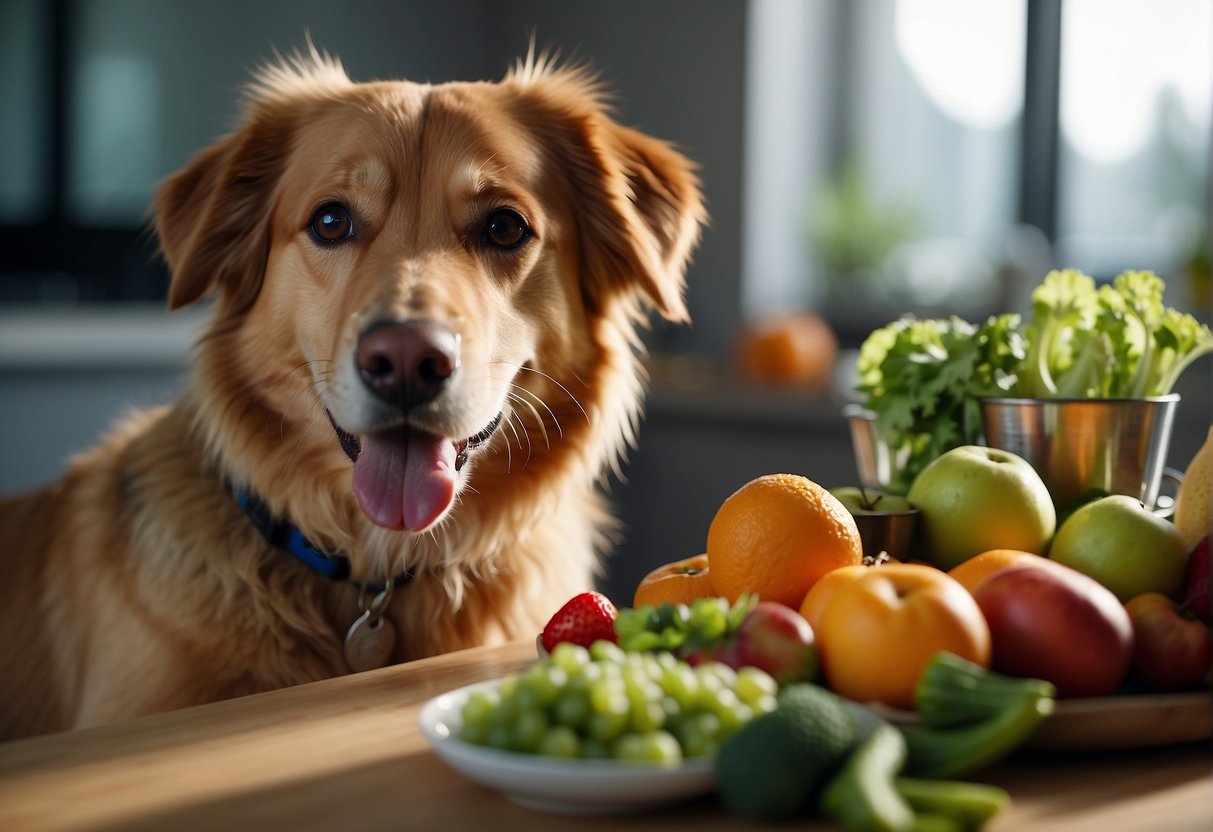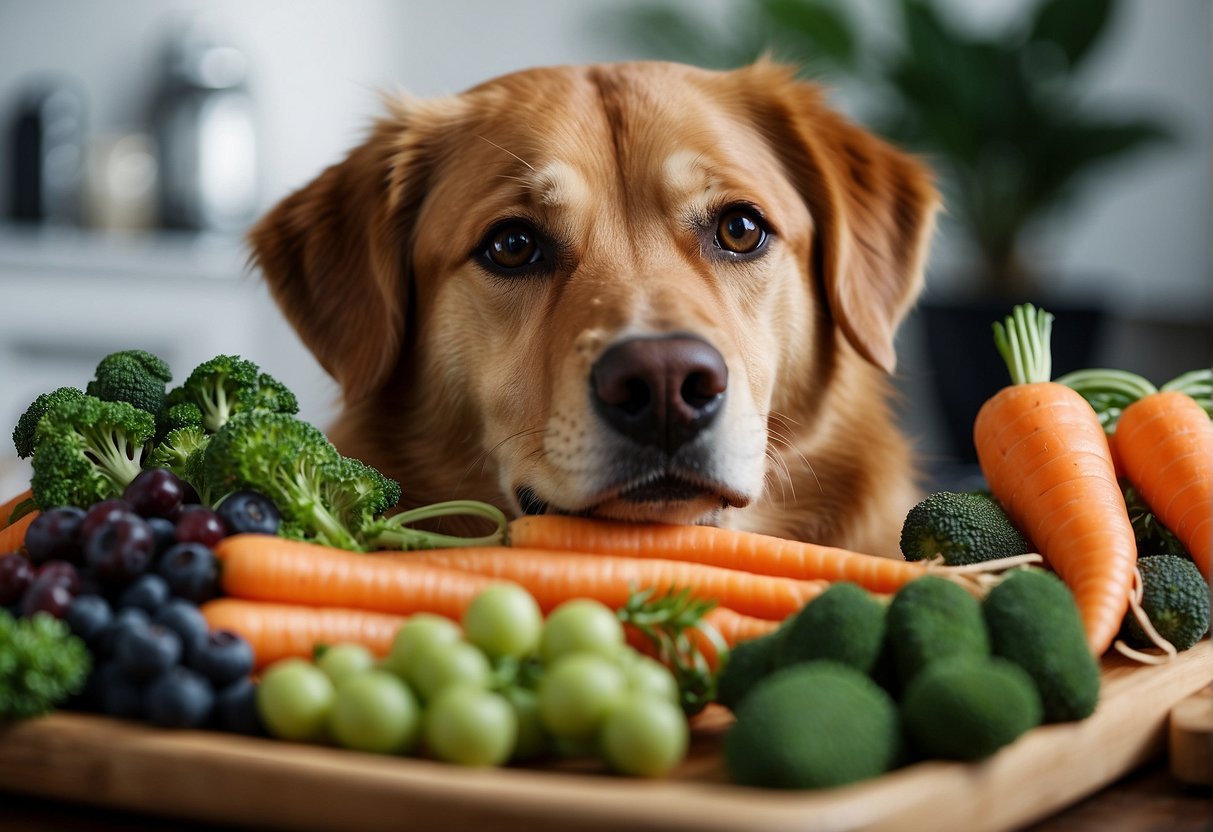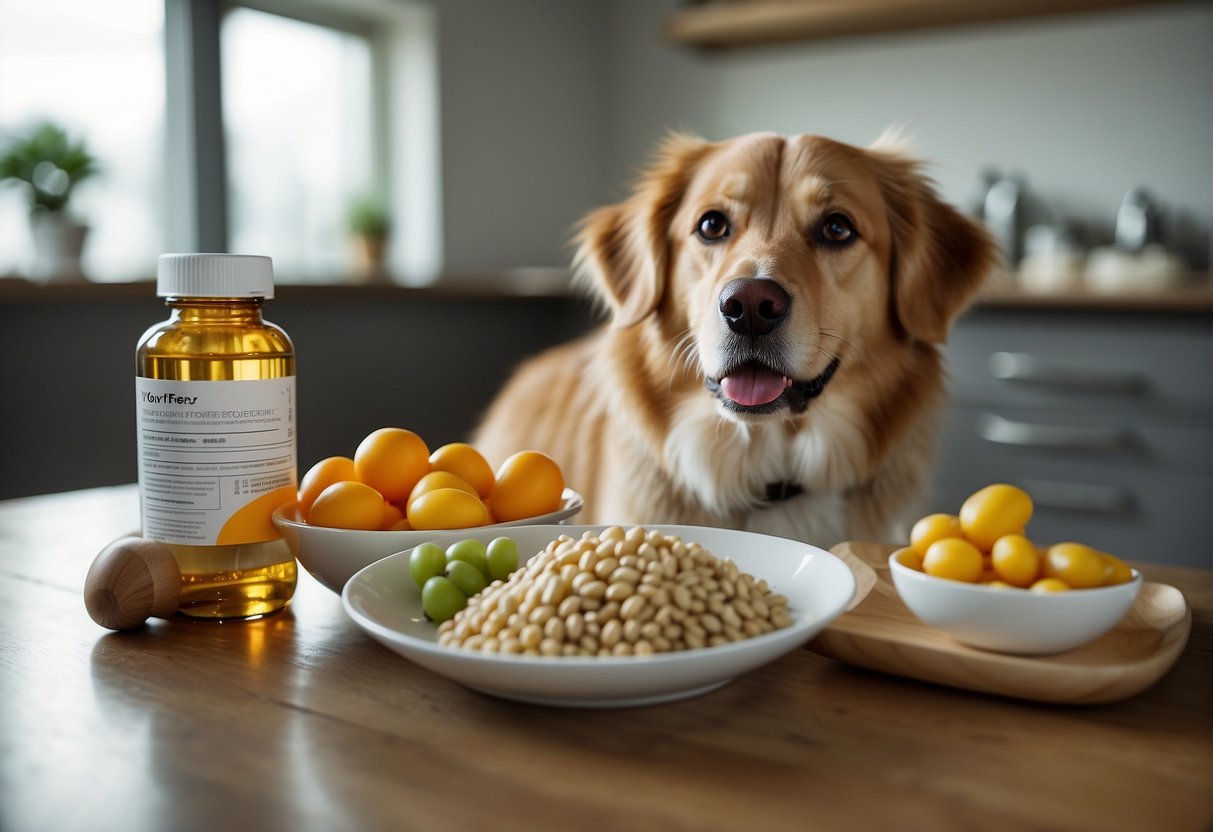Maintaining the eye health of dogs is as essential as ensuring they get regular physical exercise and affection.
Like humans, dogs can suffer from a range of eye conditions that can impact their quality of life.
However, many pet owners might not be aware that their furry friend’s diet plays a crucial role in their eye health.
Nutrients such as antioxidants, vitamins, and minerals in certain foods can significantly promote ocular well-being in dogs, keeping their vision sharp and their eyes clear.

A balanced canine diet enriched with specific nutrients can help prevent the development of eye diseases and support overall vision.
Foods that are high in antioxidants, such as blueberries and sweet potatoes, are not just tasty treats but could also help to combat oxidative stress, which is a factor in many eye diseases.
Essential fatty acids, particularly Omega-3 found in fish like sardines, are known to support retinal health and may reduce the risk of dry eyes.
Moreover, vitamins such as Vitamin A, often present in eggs, are vital for maintaining good vision.
A dog’s body uses Vitamin A to produce the pigments in the retina, which is crucial for low-light and color vision.
Incorporating these elements into a dog’s diet is quite beneficial.
Knowing which nutrients are key can guide dog owners in choosing the best foods to support their four-legged companions’ eye health.
Understanding Canine Eye Health

Maintaining eye health is crucial for dogs as they age, with a variety of eye problems potentially affecting them.
This section will explore the common issues and preventative measures to help keep a dog’s eyes healthy.
Recognizing Common Eye Problems in Dogs
Dogs can suffer from several eye problems, much like humans do.
Some of the most common eye problems in dogs include:
- Cataracts: Appearing as cloudy or opaque areas on the lens of the eye, cataracts can lead to blindness if not treated.
- Glaucoma: Increased pressure within the eye can damage the optic nerve, leading to pain and potential blindness.
- Dry Eye (Keratoconjunctivitis Sicca): When a dog’s eyes do not produce enough tears, it can result in dryness, leading to discomfort and vision issues.
- Conjunctivitis: Inflammation or infection of the outer lining of the eye, known as “pink eye,” can cause redness and discharge.
- Uveitis: This is the inflammation of the interior eye structures and can be an indicator of underlying disease.
These eye disorders can affect dogs of all ages, but senior dogs are at a higher risk for conditions such as cataracts and macular degeneration.
Early recognition and treatment are essential in preserving sight and comfort.
Preventing Eye Diseases and Disorders
Preventative care plays a fundamental role in a dog’s eye health, and there are several steps one can take to reduce the risk of eye diseases:
- Regular Veterinary Check-Ups: Routine examinations by a vet can help catch eye problems early on before they worsen.
- Diet: A diet rich in antioxidants can support eye health.
Foods like blueberries and sweet potatoes are beneficial for maintaining good vision.
- Eye Protection: Shielding a dog’s eyes from harsh light or debris with goggles can help prevent injury and disorders.
- Cleanliness: Keeping a dog’s eye area clean reduces the risk of infections such as conjunctivitis.
While it’s not possible to prevent all eye conditions, these strategies can greatly decrease the incidence of eye diseases and contribute to a dog’s overall well-being.
Essential Nutrients for Dog Eye Care

Proper nutrition plays a crucial role in maintaining the health of a dog’s eyes.
Certain nutrients are particularly vital for preventing eye conditions and supporting overall eye function.
Here we’ll explore antioxidants and omega-3 fatty acids, two groups of nutrients essential for canine ocular health.
Antioxidants and Their Role in Eye Health
Antioxidants are molecules that combat oxidative stress, which can damage cells in the eyes.
Vitamin C and Vitamin E are potent antioxidants that protect eye tissues from free radicals.
Dogs also benefit from antioxidants like lutein and zeaxanthin, which are types of carotenoids found in foods like blueberries and kale.
These carotenoids filter harmful light and prevent damage to the retina.
Nutrition rich in beta carotene, a precursor to Vitamin A, is critical for good vision as it helps maintain the function of the cornea and reduces the risk of night blindness.
- Key Antioxidants for Eye Health:
- Vitamin A: Essential for normal vision.
- Vitamin C: Protects eye cells from damage.
- Vitamin E: Works with Vitamin C to keep cells healthy.
- Lutein & Zeaxanthin: Protects the eyes from harmful light.
- Beta Carotene: Converts to Vitamin A and improves vision.
The Importance of Omega-3 Fatty Acids
Omega-3 fatty acids are essential fats that play a vital role in eye health.
They are found in high concentrations in the retina and are crucial for maintaining the integrity of the ocular surface.
Omega-3 fatty acids aid in the development and repair of eye cells and can help reduce the risk of dry eye conditions.
They can be sourced from supplements or a diet rich in fish like salmon, which is known for its high omega-3 content.
Incorporating omega-3 rich fatty foods such as deep frozen salmon into a dog’s diet can support their overall eye health.
- Sources of Omega-3 Fatty Acids:
- Deep frozen salmon
- Flaxseeds
- Walnuts
Taking care of a dog’s diet by including these essential nutrients can significantly contribute to the likelihood of having a lifetime of healthy vision.
Dietary Choices to Support Eye Health

Nutrition plays a crucial role in maintaining a dog’s eye health.
Specific foods and supplements can help support vision and prevent common eye issues.
Best Foods for Healthy Eyes
Certain foods are rich in nutrients beneficial for a dog’s eye health.
- Blueberries: These small fruits are packed with eye-friendly carotenoids like lutein and zeaxanthin, which have been shown to support good vision in dogs.
- Sweet Potatoes: Sweet potatoes are an excellent source of beta-carotene, which can help maintain proper eye function and overall eye health.
- Carrots: Similarly, carrots contain high levels of beta-carotene, which is crucial for the maintenance of good vision in dogs.
- Kale: This leafy green is another great source of lutein and zeaxanthin.
- Salmon: Rich in omega-3 fatty acids, salmon supports retina health and may improve ocular conditions.
- Pumpkin: It’s not just beta-carotene—pumpkin also contains lutein and zeaxanthin, aiding in eye health defense.
- Sardines: These small fish are high in omega-3 fatty acids, just like salmon, supporting eye health.
- Tomatoes: Tomatoes are rich in lycopene and vitamin C, antioxidants that can contribute to healthy vision.
Including these foods in a dog’s diet can provide the necessary nutrients to support and maintain healthy eyes.
Supplements for Eye Health
Beyond a proper diet, certain supplements can be beneficial for a dog’s eye health.
- Fish Oil: High in omega-3 fatty acids, fish oil can help combat dry eyes and other eye health issues in dogs.
- Eye Supplements for Dogs: There are various canine-specific supplements that contain a blend of nutrients tailored to support ocular health.
- Bilberry: Known to aid in night vision, bilberry supplements can be an adjunct in maintaining eye health.
- Grape Seed Extract: This supplement possesses antioxidant properties thought to protect the eyes from free radicals.
- Astaxanthin: An antioxidant that’s more potent than lutein and zeaxanthin, astaxanthin may offer significant eye health benefits for dogs.
Supplements should always be discussed with a veterinarian before adding them to a dog’s diet to ensure they are appropriate and safe for the individual pet’s health needs.
Common Eye Issues and Treatments

In the canine world, eye problems can range from mild irritations to severe conditions requiring immediate attention.
Understanding common eye issues and their respective treatments is vital for dog owners to ensure the health and comfort of their furry companions.
Addressing Eye Infections and Inflammation
Conjunctivitis, characterized by inflammation of the eye’s conjunctiva, often manifests with symptoms like redness, swelling, and discharge.
Initial treatment usually involves cleaning the affected area with saline solution and the application of eye drops designed to combat infection and control inflammation.
Should dry eyes contribute to the problem, artificial tears may be recommended to lubricate the eyes and alleviate discomfort.
Infections causing discharge require prompt care to prevent complications.
Owners can clean away any buildup gently with damp cotton balls.
However, for persistent or severe infections, it’s crucial to seek veterinary attention.
A veterinarian might prescribe antibiotics or anti-inflammatory medications tailored to the dog’s specific condition.
Professional Care for Vision Issues
In cases of severe or chronic eye problems, professional care from a veterinary ophthalmologist may be necessary.
They are equipped to diagnose issues like deeper infections, structural eye damage, or genetic conditions that might impair vision.
Advanced treatments, ranging from specialized medications to surgery, might be the course of action.
Owners should monitor their dogs for any signs of eye issues, such as behavioral changes or reluctance to explore familiar environments.
These can indicate underlying vision problems. In such scenarios, a thorough eye examination is critical.
Consistent and early veterinary care can be the difference between a minor issue and a significant threat to a dog’s eyesight.
Lifestyle and Environmental Considerations

Maintaining healthy eyes in dogs goes beyond nutrition; it encompasses their overall lifestyle and environment.
These factors can significantly influence their eye health, highlighting the importance of routine checks and preventative measures to avoid potential eye problems.
The Impact of Environment on Eye Health
Dogs are exposed to various environmental factors that can affect their eye health.
Elements like dust, wind, and UV rays can irritate or harm their eyes.
It’s essential to protect a dog’s eyes during outdoor activities with appropriate eyewear, especially if they spend a lot of time outside or in rugged conditions.
For example, when they join their owners on hikes or are frequently exposed to bright sunlight, measures such as visors or dog goggles can help shield their eyes from debris and UV damage.
In addition to physical barriers, maintaining clean, smoke-free living conditions is also crucial.
Secondhand smoke and chemicals in the air can lead to chronic eye irritation or more severe eye problems in dogs.
Routine Checks and Preventative Measures
Regular home examinations are vital for a dog’s health.
Owners should gently examine their dog’s eyes, being alert for signs and symptoms of eye problems, which might include redness, swelling, or discharge.
Early detection of abnormalities can prevent the escalation of conditions that could impair eye health.
Veterinary check-ups play an indispensable role as well.
They should annually assess a dog’s eye health, checking for abnormalities and discussing the potential need for protective measures depending on the dog’s lifestyle.
As a preventative measure, teach dogs to be comfortable with face and eye cleaning routines to remove any accumulated dirt gently.
In conclusion, by understanding and mitigating the risks posed by the environment, and staying vigilant with checks and cleaning, owners can greatly contribute to the health and longevity of their canine’s vision.















